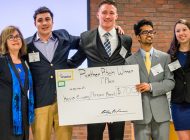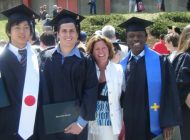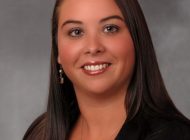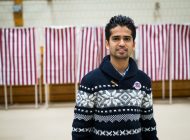A portrait of an increasingly international university where visiting faculty, exchange programs, and foreign-study trips are all part of educating students in the new world—and whose graduates are making a mark in the global economy.
When Deb Regan started at Plymouth State in 1998 with a charge to develop experiential learning and off-campus opportunities, there was no office on campus designated for international students or study abroad programs. Just eight students were doing anything at all in other countries, all of them in large part through their own persistence. “We went from eight folders being handed to us,” Regan says, “to 100 students who will spend a semester abroad this year and another 120 or so who will go on international faculty-led trips.”
The growth is both intentional and symbolic. Now the director of PSU’s Global Education Office (GEO), Regan oversees an increasingly diverse, multicultural array of experiential and off-campus opportunities that contribute to the evolving definition of what it means to educate students in the twenty-first century. As the world’s economies—and challenges—become increasingly integrated and interdependent, as digital technology profoundly accelerates the exchange of products, services, and ideas, the University’s role of educating future leaders has become more global in nature as well.
Tapping into International Alumni Networks
Those future leaders can tap into a network of PSU alumni whose professional portfolios already include substantial international elements. Many of those graduates—such as John Garnsey ’73, Hunt Ramsbottom ’79, Leesa Smith ’84, and Joe Teno ’85G—attended Plymouth State at a time when there was little global education on campus. But the quality of their business education prepared them for careers that would expand, in ways they could never have predicted, far beyond the borders of New England and the United States. Their wisdom and experience create an additional international resource for today’s students.
It’s beautiful here,” says Peng-Khuan Chong, a professor of political science who brings an international perspective to class every day. “But I tell my students they need to get out of their comfort zones. I tell them that the University can give them skills and knowledge, but going somewhere else tests those skills and knowledge. That experience develops competence, confidence, and compassion. My students call them ‘Chong’s Cs.’” Chong, a part of the faculty for nearly 50 years, has played an active role in expanding Plymouth’s international footprint. In 2011 and 2012, he helped establish PSU student and faculty exchanges with Universiti Tenku Abdul Rahman (UTAR) in Kampar, Malaysia, and Sunway University in Kuala Lumpur. He is a board governor and visiting professor at Houdegbe North American University in Benin, West Africa.
“If you don’t have a passport—get one”
Leesa Smith ’84, an executive with the German-owned multinational corporation Freudenburg, confirms from the professional world what Chong tells his students on campus. “In order to win the game,” she says, “we’re going to need diverse management teams. We’re going to need people with cultural experience that you can’t get from only being in a classroom.” Smith, who regularly travels overseas for business, is one of a growing number of PSU graduates working on the international stage. “Students should absolutely take advantage of any opportunities they have to travel abroad,” she says. “To Plymouth State students, I would say: If you don’t have a passport—get one. If an opportunity comes up—jump on it.”
John Garnsey ’73, who oversees global mountain development for the world’s largest ski company, Vail Resorts, puts it this way: “English may be the universal language of business, but there are so many cultural perspectives and differences around the world that are subtle, even between the US and Western Europe. Being able to travel and work in different countries allows a much deeper understanding of where people come from. That understanding is crucial for both relationships and negotiations.”
Study Abroad, Starting First Semester, First Year
Among the foreign study programs that PSU offers, the most eye-opening might be the Freshman Abroad Program, an innovative model among American universities that allows accepted students to spend the first semester of their first year studying at the University of Limerick in Ireland. Each year, some 20 incoming Plymouth first-year students take advantage of the program and become first-year students at the University of Limerick. Half of them, typically, are New Hampshire residents with little or no prior travel experience. “It’s a powerful way for those students to start their college experience,” says Deb Regan, GEO director. “They come back to Plymouth State with self-confidence, self-awareness, and a greater appreciation for how big the world is. Their experience changes the campus back home, and makes it more diverse and worldly.” The timing of the program, coming at the start of a PSU education, also sends a powerful message, according to Regan: international perspective is important to us.
Upper-class students have additional opportunities, ranging from semesters studying environmental science in Torino, Italy, to archaeological digs in Scotland, to shorter faculty-led trips in Africa and Asia. Students who are a part of PSU’s Model UN have attended world conferences in Mexico, Singapore, and Helsinki. Other undergrads have designed and planned service trips to the developing world, such as helping build a primary school in Nicaragua and implementing a sustainable water system in eastern Africa. Many students who go abroad come back and switch their majors or think differently about future careers: the course of their lives is changed by their international experience.
The chance to work and live in foreign cultures, in many cases, fosters an openness to new experiences and an ease with confronting unfamiliar situations—intangible assets that employers value highly. Hunt Ramsbottom ’79, CEO of Rentech, a global supplier of wood fiber and wood pellets for heating, oversees manufacturing and supply-chain operations in the US, Canada, and South America. “We have a bunch of young, smart people in our company,” he says, “and not all of them are up for the challenge of living and working in a different country. But the ones who understand languages and cultures … I value them especially. We can deploy them and let them run.
I’d encourage students to learn languages and work abroad. Those graduates will be like gold to employers.”
International Partners
Currently, PSU has formal exchange arrangements with 10 partner institutions around the world, including the Dalarna University in Sweden, the Hong Kong Institute of Education, and the Universidad Austral de Chile. A broad variety of programs and opportunities is available through respected and vetted study-abroad providers, such as French-language immersion summers in Nova Scotia and the Semester at Sea program, a multiple-country study abroad program. All of them, fundamentally, aim at the same purpose.
Provost Julie Bernier says the University—especially in this increasingly global world—has an obligation to expose students to rich cultural and educational experiences, both domestically and internationally. The University has thought creatively about how to make a wide range of those opportunities available.
Ideally, Bernier says every single PSU student should have the chance to travel abroad. “Because of economics, though,” she says, “that’s not possible. Recognizing that reality, we try to bring the experience to them.” She points out the global studies academic requirement of all students, the faculty exchanges that bring international perspectives and expertise into classrooms, the international workshops, campus events, and student organizations. “We no longer live in a world where you interact only with people in your local community or your state,” she says. “It’s critical for our students to know how to interact and work with people from different backgrounds and cultures.”
Increasing Diversity Through International Student Enrollment
Jim Hundrieser ’90G, vice president for enrollment management and student affairs, reflects on the increasing diversity within the student body. “Twenty-five years ago, there might have been eight or ten international students on the entire campus,” he recalls, “and most of them were on the soccer team.” Today, between 70 and 100 international students are enrolled at PSU each semester. They come through exchange programs from Malaysia, Japan, Romania, Latin America; they come full-time from England, Sweden, Canada, and China. During the spring of 2014 alone, some 29 countries were represented among the student body. “Think of the richness those students add to the community,” Hundrieser says.
Increasing the number of international students on campus is the University’s goal. In addition to the educational value to the community of learners, Hundrieser says there’s an untapped market of international students for whom Plymouth State would be a good fit. To help identify and recruit students from one especially promising part of that market, the University has recently opened an affiliate office in the Chinese city of Chengdu. The overall goal is ambitious: raise the number of international undergraduate and graduate students on campus to 430 by the year 2020.
It’s all part of the evolution of what it means to best serve a state, a region, and its students. From its founding in 1871 as Plymouth Normal School to becoming Plymouth Teachers College in 1939, to its development as Plymouth State College in 1963 and to Plymouth State University four decades later, the institution has changed in relation to the changing world around it. PSU has continually made its education relevant and made its students more employable and better prepared for the world they enter upon graduating. Higher education, at its best, pushes students beyond their personal boundaries: it offers avenues for exploration and self-discovery. In the end, it’s not the institution’s changes that define the education. It’s the change that happens in each and every student.
And some things don’t change. Says Joe Teno ’85G, former L.L. Bean executive and founder of QOR, a new line of men’s active apparel, “I’d have to say that the fundamental elements of being a good person and a good business person are the same: trust, integrity, and treating people well. There are universal standards of behavior that transcend countries and nationalities. Being out in the world helps build that character.”
Players on the World Stage
The Entrepreneur
Hunt Ramsbottom ’79 was typical in many ways of the students at Plymouth State College in the late 1970s. He came from Providence, RI, from a hard-working family that owned and ran a small printing company. He studied business and played on the lacrosse team. He worked pumping gas and waiting tables in Waterville Valley. At that time, there wasn’t much international experience or exposure available to students at Plymouth State, formally or informally.
In his business classes, Ramsbottom learned nuts-and-bolts economics and business strategy, without much regard for the world outside of the northeastern United States. “I had one professor, though—Hennessy—whose brother was a CEO of a big conglomerate,” says Ramsbottom. “He was always talking about him. That really interested me.”
Ramsbottom returned to Providence with a BS in Business Administration and worked in the family printing business, but couldn’t shake the idea of wanting a bigger platform. Sensing an opportunity in the printing of software documentation and technical materials, he moved to the West Coast and started a niche printing company of his own. He sold it before he was 30, for a profit, and discovered an affinity for risk and a taste for acquiring and selling companies. He led a leveraged buyout of a California-based chain of automotive paint stores, aggressively pursued mergers and acquisitions, and grew the multi-state business into the largest supplier of auto paint in North America before taking it public in 1995.
Ten years later, by the time he became CEO and president of Rentech, a technology startup involved with developing alternative fuels, Ramsbottom had bought and sold nearly 70 small and medium-sized companies. When energy market conditions drastically changed, Ramsbottom sold off the Rentech technology to a Chinese company and pivoted the company into the supply and distribution of wood fiber, eventually operating 39 facilities in the US, Canada, Chile, and Uruguay, becoming a world leader.
In spring 2014, Rentech announced the purchase of the country’s largest supplier of home-heating wood pellets, New England Wood Pellet, headquartered in Jaffrey, NH. The acquisition secured a deep supply for, among other things, long-term contracts with coal-fired power plants in the UK and Canada converting to biomass. It also brought the entrepreneur back home, in a sense—and expanded the kind of big-business platform he’d once dreamed about as a student at Plymouth State.
The Liaison
When she’s not traveling, Leesa Smith ’84 splits her professional time between offices in New Hampshire and Michigan, overseeing North American operations in the US, Canada, and Mexico for a multinational corporation headquartered in Germany. She is the archetypal twenty-first-century global executive.
Smith received an accounting degree from Plymouth State in 1984, then an executive MBA degree from the UNH Whittemore School of Business. She’ll never forget a demanding accounting professor who expected more from her than she thought she had in her. “The fact that he didn’t make it easy turned out to be a key experience for me,” she says. “For the first time in my life, I learned I could push.” A prime opportunity came when Freudenberg, a 140-year-old family-owned German corporation, created a North American subsidiary in New Hampshire called Freudenberg NOK, and hired Smith as its new treasury manager.
She found herself in-state, learning on the job in a foreign environment—the engineering and manufacturing of automotive sealing and gaskets—within a diversified global corporation that produced, in particular, lubricants, sealants, vibration technology, surface coatings, and non-linen textiles for industries ranging from aerospace to medical to apparel to heavy construction. Nominally in charge of accounting, Smith recognized gaps in other areas and tried to address them. She had a mentor who pushed her toward the edge of the envelope without letting her get cut. She raised her hand for unpopular projects. (“Why was a treasury director the one to write the company’s policy on alcohol and drug abuse?” she asks.) She showed a talent for looking at the big picture. The home front noticed.
After a promotion to director of finance, Smith created a shared accounting center in Michigan that coordinated treasury, insurance, and pension management across all of Freudenberg’s 15 business groups in North America, covering some 6,000 employees and 21 percent of the corporation’s annual $8 billion in sales. In 2011 Smith became the first woman ever appointed to the corporation’s global executive team, where she “interfaces with legal, tax, human resources, finance, and communications at the parent company board level.” She represents North America in quarterly strategic meetings in Germany alongside regional representatives from Latin America, China, India, and Southeast Asia.
She recently needed additional pages put into her passport. “That feels a little like an honor to me,” she says.

John Garnsey ’73 (left) with Peter Schröcksnadel, president of the Austrian Ski Federation, following an aerial survey of ski resorts near Innsbruck, Austria.
The Matchmaker
“I was at Plymouth State in the Dark Ages,” says John Garnsey ’73. “There wasn’t much back then in the way of international exposure. But Plymouth allowed me to get a degree in business in a beautiful setting while I pursued my passion, which is skiing.”
He started at the bottom of the hill, working as a ski patroller at Waterville Valley. He moved west a year after graduating to Vail, CO, where he joined Vail Mountain’s racing department and trails crew and found his life’s work. He steadily climbed through the ski area’s mountain operations, then became vice president of the fledgling Vail Valley Foundation, a nonprofit dedicated to enhancing the valley’s athletic, cultural, and educational programming. He was instrumental in bringing the 1989 World Alpine Championships to the Vail Valley, a massive event drawing athletes from 80 countries and international media exposure reaching more than a billion spectators and fans of the sport. In the process, he began cultivating relationships across the skiing parts of the globe that would flourish throughout his career.
From 1991 to 1999, Garnsey served as president of the foundation. He helped bring the world championships back to Vail/Beaver Creek a second time, then joined Vail Resorts as senior vice president and chief operating officer of Beaver Creek. In 2008, he was named president of the company’s global mountain development. As part of the premier ski company in North America, with 10 resorts in Colorado, California, and the northern Midwest, “it made sense to look at my position and my contacts,” Garnsey says, “and see what I could do to help the company grow internationally.”
Garnsey has spent the past several years reconnecting with old acquaintances and making new ones in Western Europe, Central Europe, China, and Japan, looking for the right opportunities for acquisition and synergy. “We’re not the only ones looking internationally,” he says, “but we’re probably out in front.” He’s strategically involved with Vail’s international sales team, which works with agents and tourism companies to bring foreign skiers to the Vail Valley. (Among other programs, Vail has reciprocity agreements with resorts in Austria, France, China, and Japan, that encourage skiers to travel in both directions.)
Garnsey says the travel and face-to-face experiences have given him a deeper understanding of the different cultures and helped with his ability to negotiate and to explain his company. “The ski industry is a small world,” he says. “Skiing is really a universal language with a lot of dialects. But the models are very different depending on where you are.” To pick just one example: American resorts tend to control the entire skier’s experience, from on-mountain to lodging, dining, and entertainment, while French resorts have very complicated overlapping partnerships and agreements to provide those services. Finding the right fits involves diligence and trust on both sides.
Meanwhile, Garnsey has been inducted into the Colorado Ski and Snowboard Museum Hall of Fame and received the US Ski and Snowboard Association’s Julius Blegen Award for lifetime service to the sport. He successfully co-chaired a campaign to bring the World Alpine Championships back to the Vail Valley in 2015.
In April this year, he announced he’ll retire from his full-time position following those international races, a fitting capstone to an ambassador’s career.
The Retailer
“I can’t give you a sound bite on Plymouth,” says Joe Teno ’85G. “Most of my classes were held off-site in Hanover. I had a full-time job as a master plumber and got my MBA at night. But I will say that the passion and energy of the instructors were phenomenal. They absolutely moved me onto a different path.” That path led to a finance position with L.L. Bean. The quantitative analysis Teno got through Plymouth State directly prepared him for that job, he recalls. “But I remember the interviewer saying, ‘You had a job and got your MBA at night?’ I think they recognized that there was a certain reality to my living situation—that I hadn’t been at school just for fun and games. That made an impression.”
He stayed with L.L. Bean for 14 years before becoming vice president of operations and organizational development at TravelSmith. In 2001, he was hired away by a new women’s active apparel company, Athleta, where he served as senior vice president of operations and then president, the role he occupied when Gap purchased Athleta in 2008 for $150 million.
If Teno had a feel for the international threads running through the American retail industry in those positions, he’s gotten full-on immersion in his latest venture: a start-up mail-order apparel company called QOR (pronounced “core”). The business, he says, will center on functional, high-quality fabric, well-crafted performance clothing designed for men who don’t want to be treated as stereotypes. He has spent much of the past year sourcing technical fiber in Switzerland and South and Central America, finding Merino wool producers in New Zealand and Australia, and cotton growers in Portugal. He has visited vendors in Canada, China, and Hong Kong; has attended trade shows in Munich and Berlin and in Florence, Italy. He’s toured shops in Europe, looking for ideas. “The top floor at Harrods in London is wonderfully inspiring,” he says.
Teno wants the clothing and the presentation around it to be authentic, to celebrate qualities in men such as character, confidence, and vulnerability. The active part of his own résumé is authentic: Outward Bound in Maine at age 16, scores of White Mountain hikes above treeline, four years in the army including time with the Green Beret 10th Special Forces, six New York City Marathons, a climb of Mount Rainier, and a number of “century” bike rides. “Men who have known the joys of being active have also come to terms with their limitations,” he says. “When you reach that point in your life, it changes your relationship to other people and to the world.”
At times, his travel schedule has been relentless and exhausting—and exhilarating. He says he has worked hard in his life, but never harder than he’s working right now. The first QOR catalogues hit mailboxes in October. ~Jim Collins
Tags: Africa Asia business China experiential learning freshman abroad global Helsinki international Ireland Italy MBA Mexico Scotland Singapore study abroad Sweden travel


















